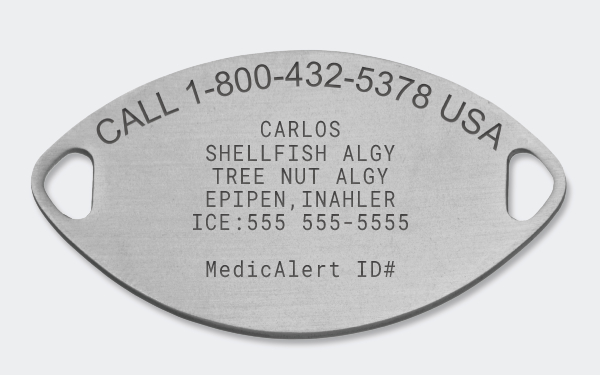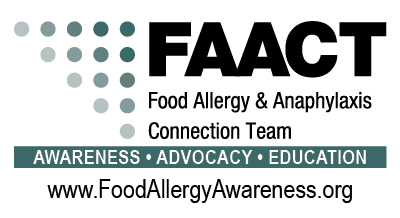Help others help you. Wear a medical alert ID bracelet or necklace engraved with important information for emergency responders and healthcare providers
Centers for Disease Control & Prevention

Medical IDs for Shellfish Allergy
The confidence to live with shellfish allergy
Shellfish allergies, like any serious food allergy, command a lot of attention. People with this allergy can experience a serious, potentially life-threatening reaction if they are exposed to shellfish or sometimes even foods that have been cross-contaminated by contact with shellfish. Knowing how to identify a shellfish allergy, avoid exposure, and manage an allergic reaction are all important if you suspect you have this problem.
That’s why medical IDs for shellfish allergy are so critical for people living with the condition.
How MedicAlert protects those living with shellfish allergy
One thing you shouldn’t worry about is what could happen if there’s an emergency. MedicAlert’s protection plans offer benefits that extend beyond the ID, providing safety and peace of mind for people living with shellfish allergy, their families and caregivers.

24/7 Emergency Response
Our team provides first responders the information they need to provide fast, accurate care.

Digital Health Profile
All your vital information, all in one place for you and your caregiver.

Emergency Contact Notification
In an emergency, we connect families so that no one is alone in a crisis.

Patient Instructions
Share the information that’s important to your care, such as use of rescue medications or contraindication for tests like MRIs.
Pair medical IDs for shellfish allergy with the protection plan that’s right for you.
What exactly is a shellfish allergy?
When someone has a food allergy, their body overreacts to exposure to specific foods as though the food is a foreign invader. A shellfish allergy is a type of food allergy. The reaction can be mild, such as hives, or it can be more dangerous, leading to life-threatening symptoms.
Shellfish fall into two categories: crustaceans, which are shrimp, crayfish, crab, and lobster, and mollusks, which are clams, scallops, oysters, and mussels. Crustaceans are more commonly the cause of shellfish allergies, which affects around 2% of people.
A shellfish allergy is not the same as a fish allergy, and shellfish allergies do not cause reactions to iodine or contrast dye containing iodine, as previously believed. In the past, it was thought that the iodine in shellfish was responsible for allergic reactions, but it’s now understood that the two are unrelated.
What causes a shellfish allergy?
Your immune system is responsible for identifying threats like viruses and bacteria and mounting a response to eliminate them. With a shellfish allergy, your immune system mistakenly targets a protein in shellfish as harmful, even though it is not. According to the Mayo Clinic, immunoglobulin E (IgE) antibodies are produced by the immune system to recognize and target the “intruder.”
Once IGE recognizes the shellfish protein, whenever you are exposed to shellfish, the IgE antibodies trigger an immune system response, releasing chemicals like histamine to attack the protein.
People who have a shellfish allergy may be allergic to any type of shellfish, or only one. When shellfish comes in contact with other food during storage or cooking, the protein can transfer to that food and trigger a reaction as well. It’s important to work with your doctor to figure out what kind of shellfish is causing the reaction, so you know what to avoid.
What to engrave on MedicAlert medical IDs for shellfish allergy:
MedicAlert offers free custom engraving on all our shellfish allergy bracelets and medical ID products. Engravings on medical IDs for shellfish allergy should include any critical medical information that can protect and save lives in an accident or medical emergency, for example:
- History of shellfish allergy
- The need for an EpiPen in an emergency
- Any other medications or allergies
- Other medical conditions

Sample engraving. Consult our team if you need help engraving your medical ID for shellfish allergy.
What are the symptoms and complications of a shellfish allergy?
When someone is exposed to shellfish, there is a range of symptoms that can happen. These may not be the same every time, even for the same person. Symptoms of shellfish allergy include:
- Hives and itching
- Stomach cramps/indigestion
- Nausea and vomiting
- Diarrhea
- Wheezing
- Cough
- Shortness of breath
- Hoarse voice or tight throat
- Weak pulse
- Pale or bluish color to the skin
These symptoms can lead to serious complications, including anaphylaxis, a life-threatening severe allergic reaction. Even if you’ve never had anaphylaxis in the past, the abnormal immune system response that happens during a shellfish allergy can put you at risk for this problem.
Symptoms of anaphylaxis include:
- Swelling of the lips, tongue, and throat
- Hives, rashes, and itching
- Trouble breathing and/or wheezing
- Feeling like something bad is about to happen
- Stomach pain, vomiting, or diarrhea
- Uterine cramps
How do you diagnose a shellfish allergy?
Shellfish allergies can be difficult to diagnose. When a person notices symptoms, they may be different with each exposure. They can even be due to eating something that came in contact with shellfish without the person knowing.
Your doctor can do one of two tests to help pinpoint a food allergy: a skin prick test, or a blood test looking for antibodies to the shellfish protein. The skin prick test involves the doctor putting a drop of the suspected allergen(s) on your skin, and then scratching the skin surface right where the allergen is to see if redness or itching develops.
A blood test for high levels of IgE antibodies to shellfish can also help identify this food allergy. It’s important to know that neither the IgE antibody test nor the skin prick test can predict the severity of a shellfish allergy, and sometimes false positive results can happen.
Along with your history and symptoms that suggest a shellfish allergy, the results of these tests can help your doctor confirm a diagnosis.
If there is still doubt whether a person has a shellfish allergy, an oral food challenge test can be done. In this test, a person eats a small amount of the food that is suspected to cause a reaction. This is done in a clinic under the supervision of medical staff, in case a serious reaction develops. If there is no reaction, the amount eaten is increased during the test, to confirm or rule out an allergy.

We are proud to partner with the Food Allergy & Anaphylaxis Connection Team (FAACT), the leading patient organization for people with food allergies.
How do you treat a shellfish allergy?
The good news is that treating a shellfish allergy can reduce your risk of experiencing a serious allergic reaction. Although it’s not possible to cure the allergy, avoiding shellfish and foods containing shellfish is an important step to follow to avoid exposure.
Sometimes, even when you’re carefully avoiding shellfish, accidental exposure can happen and result in a serious allergic reaction. Because you can be at risk for an anaphylactic reaction to shellfish even if your allergic reaction hasn’t been severe in the past, your doctor may prescribe an EpiPen for you to use in an emergency.
An EpiPen contains life-saving medication in a self-injectable cartridge that you can give yourself if you have a serious reaction to shellfish. In this situation, it’s also critical to call 911 so first responders can continue your treatment if necessary.
This is where medical IDs for shellfish allergy can benefit those living with this allergy. In an emergency where every second counts, conveying important information like a shellfish allergy and EpiPen use can save your life. If you are ever in a situation where you can’t communicate these details, MedicAlert can ensure that you get the right treatment quickly.
How medical IDs for shellfish allergy combined with MedicAlert Membership provide peace of mind
By understanding shellfish allergy and how to best avoid exposure, you can live a healthy and active life. Working with your doctor to treat any possible reactions with an EpiPen gives you added safety, and adding a medical ID for shellfish allergy is another layer of protection. With all these elements in place, you can enjoy life with less worry.
- We’re your voice: If you can’t speak for yourself due to a medical emergency, your ID will speak for you – informing others about your shellfish allergy and any medications you’re taking.
- 24/7 emergency protection: In an emergency, the MedicAlert team will relay all of your critical medical information to first responders, no matter where or when your emergency happens.
- Always connected: You should never be alone in an emergency. That’s why MedicAlert will reach out to your designated contacts if you are unable to do so.
- Live with peace of mind and confidence: MedicAlert will be there for you every step of the way. You’ll have the confidence and freedom to live your life with shellfish allergy, knowing we’ve got you covered.
DISCLAIMER: THIS WEBSITE DOES NOT PROVIDE MEDICAL ADVICE. The information in this article is presented for educational purposes only and is not intended as a substitute for professional medical advice, diagnosis and treatment. Always seek the advice of a physician or other qualified healthcare provider for any questions you may have regarding a medical condition or treatment.







